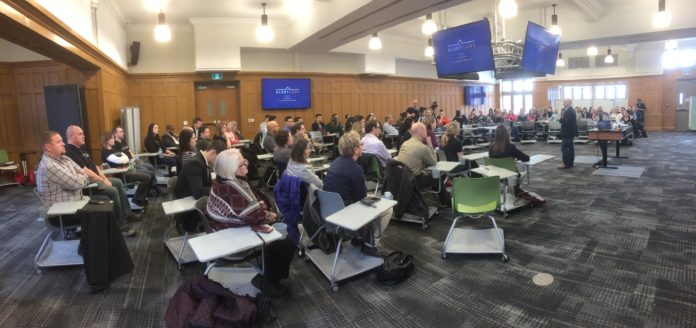What happens when startups are embedded in City Hall, paired up with an expert project team, and given the mandate to explore innovative solutions to complex challenges?
The City of Guelph found out with its Civic Accelerator, which recently wrapped its first round. City staff faced two challenges: How to help residents conserve water and how to better engage the public in the planning process.
Promising answers came through a leading-edge initiative to connect frontline City experts with startups looking to develop and sell new products to the municipal market. The Civic Accelerator brings them together to co-develop market-ready solutions. The company retains all ownership rights to the product.
“We knew the RFP (request for proposal) system works really well in most cases but not so well when there is new technology involved or when applying technology to old problems,” said Andy Best, the City’s advisor for service design and innovation.
“In an RFP, City staff detail the solution required. But that doesn’t work when staff don’t know what that solution is or where there’s no easy off-the-shelf answer. And the RFP process is inflexible. It doesn’t allow for experimenting or prototyping or trying before you buy. This is meant to be a complement for traditional purchasing in cases where there is no clear path forward.”
That was the case in searching for a way to offer tracking of real-time water usage to residents of Guelph, the largest city in Ontario to get its water exclusively from ground wells. The City has aggressive water conservation targets but no smart meters. Residents only see consumption on monthly bills.
Alert Labs in Kitchener has developed technology that “hacks” traditional water meters in a non-invasive way and sends real-time information to a resident’s phone. The system will also send alerts warning of costly floods, frozen pipes or leaks.
The other City challenge was to better inform residents of planning applications and to make it easier for them to engage in the approval process. Provincial regulations require that applications be published in the newspaper and on posted notices. But that misses a lot of residents, especially since Guelph lost its major daily last year.
Ottawa-based company Milieu has developed a web and mobile application where planners can post planning files and calendars of meetings. The public can add comments and questions.
“For planners, it streamlines the collection of feedback and for the public, it means they are getting good quality information and it’s easier to participate in the process,” said Best.
After six months of team collaboration, the Civic Accelerator announced in February that both projects will move forward with paid pilots. Best is now searching for challenges to embark on Round 2.
“Mid-sized cities are the best placed for this kind of innovation. We have the range and complexity of a big city but we’re small enough to be quick and nimble.”
The business accelerator model is common in the private sector but is only recently making its way into city halls, says Best. Guelph examined similar programs in Montreal, San Francisco and Amsterdam.
“I think we’ll see this a lot more in the next 18 months. We’ve been called by the federal and provincial governments and a whole bunch of cities who are interested in the program as a way to solve tricky problems. We’re open sourcing the Civic Accelerator, sharing all our process and insights, so that others can try it too.”
















